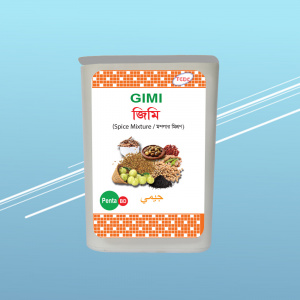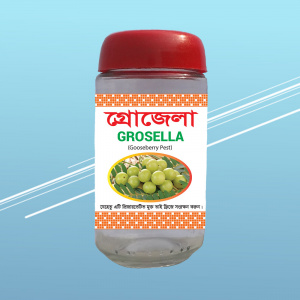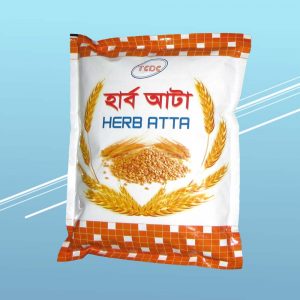Description
PENTA TEA
Penta Tea is a special type of TEA made from the bark of different plants, different seeds and stevia .
Why would you take Penta Tea?
1. Helps to relieve cold, runny cough, sore throat, headache.
2. Very helpful to strengthen the heart
3. Helps control diabetes.
4. Helps to get rid of bad breath.
5. Helps to increase digestive energy.
6. Helps in blood purification.
7. Helps the body eliminate harmful toxins.
8. Helps to keep blood concentration right.
9. Helps reduce body fat.
10. Helps reduce the pain of arthritis.
11. Helps to increase physical and mental stimulation.
Net Weight: 65gm
Ingredients:
* Arjun (অর্জুন) (Terminalia arjuna)
* Clove (লবঙ্গ) (Syzygium aromaticum)
* Cinnamon (দারুচিনি) (Cinnamomum verum)
* Black Pepper (গোল মরিচ) (Piper nigrum)
* Cardamom (এলাচ) (Elettaria cardamomum)
* Stevia (ষ্টেভিয়া) (Stevia rebaudiana)
And
* Others……
1.
The health benefits of Arjun (অর্জুন) Bark in Penta Tea:
Arjuna tree bark (Latin Name: Terminalia arjuna Wight & Arn.) is a cardioprotective botanical used in Ayurveda (East Indian traditional medicine) since 2500 B.C. It has remarkable cardioprotective, heart muscle strengthening properties. Here are good reasons to take 250 mgs of Arjuna with meals once or twice daily.
1. Arjuna bark powder is rich in saponnins, natural anti-oxidants (flavonoids) gallic acid, ellagic acid, oligomeric proanthocyanidins, phytosterols, and minerals including calcium, magnesium, zinc and copper.
2. Regular use of T.arjuna improves the pumping activity of heart, which makes it very useful for heart weakness and congestive heart failure.
3. Arjuna improves cardiac muscle strength
4. It decrease in LDL cholesterol levels. Arjuna’s ability to suppress the blood’s absorption of lipids indicates that it has cholesterol-regulating properties. Its principle constituents are §-sitosterol, ellagic acid and arjunic acid.
5. Arjuna bark is rich in Co-enzyme Q-10 which prevents incident of heart attacks.
6. Arjuna also has a tonic and diuretic effects that benefit cirrhosis of the liver.
7. It induces a drug-dependent decrease in blood pressure and heart rate.
8. The bark of Arjuna is useful as an anti-ischemic and cardioprotective agent in hypertension and in ischemic heart disease, especially in disturbed cardiac rhythm, angina or myocardial infarction.
9. Arjuna helps maintain a healthy heart and reduces the effects of stress and nervousness.
10. Arjuna enhances prostaglandins and lowers risk of coronary heart trouble.
11. Arjuna can relieve symptomatic complaints of essential hypertension such as giddiness, insomnia, lassitude, headache and the inability to concentrate.
12. In a study on the efficacy of the bark powder in treating congestive cardiac failure (CCF), over 40% of the cases showed marked improvement. CCF due to congenital anomaly of heart and valve disease was also brought under control. 4 out of 9 cases of CCF due to chronic bronchitis were also relieved by the treatment.
[Source: http://www.asianhealthsecrets.com/twelve-good-things-about-arjuna/ ]
2.
The health benefits of Cinnamon (দারুচিনি) in Penta Tea :
1. High Source of Antioxidants
Cinnamon is packed with a variety of protective antioxidants that reduce free radical damage and slow the aging process; in fact, researchers have identified 41 different protective compounds of cinnamon to date! (4) (5)
According to the ORAC scale, which is used to measure the concentration of antioxidants in different foods, cinnamon ranks #7 of all foods, spices and herbs across the world. And in a study that compared the antioxidant activity of 26 spices, cinnamon was deemed the winner and proved to be higher in antioxidants than other powerful herbs and spices, including garlic, thyme, rosemary and oregano.
Cinnamon health benefits are attributed to the type of antioxidants called polyphenols, phenolic acid and flavonoids. These are similar antioxidants to those that can be found in other “superfoods,” including berries, red wine and dark chocolate. These compounds work to fight oxidative stress in the body, which can lead to disease formation when uncontrolled, especially as someone ages.
The different antioxidants present in cinnamon help to reduce a multitude of symptoms and diseases because they are free radical scavengers. The health benefits of cinnamon include its ability to reduce many forms of oxidative stress, including the ability to limit nitric oxide build up in the blood and lipid (fat) peroxidation, which can both add to instances of brain disorders, cancer, heart disease and other conditions. (6)
2. Contains Anti-inflammatory Properties
The antioxidants in cinnamon have anti-inflammatory effects, which may help lower the risk of heart disease, cancer, brain function decline and more. Researchers have identified over seven kinds of flavonoid compounds alone in cinnamon, which are highly effective at fighting dangerous inflammation levels throughout the body.
Because cinnamon lowers swelling and inflammation, it can be beneficial in pain management, with studies showing that cinnamon helps to relive muscle soreness, PMS pains, severity of allergic reactions and other age-related symptoms of pain too. (7) (8)
3. Protects Heart Health
Studies have shown that another health benefit of cinnamon is that it reduces several of the most common risk factors for heart disease, including high cholesterol levels, high triglyceride levels and high blood pressure. (9)
The special compounds in cinnamon are able to help reduce levels of total cholesterol, LDL “bad” cholesterol and triglycerides, while HDL “good” cholesterol remains stable. Cinnamon has also been shown to reduce high blood pressure, which is another threat for causing heart disease or a stroke. (10)
And there are even more heart health benefits of cinnamon. Research shows that cinnamon is a helpful blood coagulant and prevents bleeding by helping the body to form blood clots. Cinnamon also increases blood circulation and advances bodily tissue’s ability to repair itself after it’s been damaged. This includes heart tissue, which is in need of regeneration in order to help fight heart attacks, heart disease and stroke.
4. Helps Fight Diabetes
Cinnamon is known to have an anti-diabetic effect. It helps lower blood sugar levels and also can improve sensitivity to the hormone insulin, which is the vital hormone needed for keeping blood sugar levels balanced. (11)
Diabetes is formed when insulin resistance occurs and poor glycemic control takes places, or someone develops the inability to manage how much sugar (glucose) enters the blood stream. The same problem with insulin resistence is also associated with other conditions like metabolic syndrome and weight gain, too.
These benefits of cinnamon exist because it plays a part in blocking certain enzymes called alanines, which allows for glucose (sugar) to be absorbed into the blood. Therefore, it has been shown to decrease the amount of glucose that enters the bloodstream after a high-sugar meal, which is especially important for those with diabetes.
For this reason, many studies have shown that people with type 2 diabetes can experience significant positive effects on blood sugar markers by supplementing with cinnamon extract. (12)
5. Helps Defend Against Cognitive Decline & Protects Brain Function
Research also shows that another benefit of cinnamon’s protective antioxidant properties is they can help defend the brain against developing neurological disorders, such as Parkinson’s and Alzheimer’s diseases. (13)
One way cinnamon protects cognitive function and brain health is by activating neuro-protective proteins that protect brain cells from mutation and undergoing damage. This further reduces the negative effects of oxidative stress by stopping cells from morphing and self-destructing.
Because cinnamon contains so many antioxidants and anti-inflammatory compounds that reduce the effects of aging on the body and brain, in the future, we may see it being used as a possible natural therapeutic treatment or prevention for age-related neuro-degenerative diseases.
6. May Help Lower Cancer Risk
Because of its antioxidant abilities, cinnamon can help protect against DNA damage, cell mutation and cancerous tumor growth. Studies have revealed the health benefits of cinnamon that come from a compound called cinnamaldehyde include its possible ability to inhibit cancer tumor growth and protect DNA from damage, while also encouraging cancerous cells to self-destruct (called cell apoptosis). (14)
This is especially true in the colon; studies show that cinnamon can improve the health of the colon, thereby reducing the risk of colon cancer. (15) Cinnamon is now being investigated as a natural anti-cancer agent because of its strong antioxidant abilities, so in the future, it may be useful for those who are at higher risks for cancer to supplement with cinnamon extract.
7. Fights Infections & Viruses
There are many benefits of cinnamon when it comes to defending the body from illnesses. Cinnamon is a natural anti-microbial, anti-biotic, anti-fungal and anti-viral agent. The immune-boosting abilities of cinnamon are found in cinnamon’s essential oils. (16)
Cinnamon is used in many cultures to naturally help fight harmful infections and viruses. Cinnamon oils also have protective abilities against various bacteria which can cause negative symptoms in the digestive tract, on the surface of the skin, and can lead to colds or the flu.
8. Protects Dental Health & Freshens Breath Naturally
In studies, the extracts found in cinnamon were shown to be protective against bacteria living in the oral microflora that could cause bad breath, tooth decay, cavities or mouth infections. The essential oil from cinnamon has been shown to be more potent than other tested plant extracts and can be used to naturally combat bacteria in the mouth, acting like a natural anti-bacterial mouthwash.
Similarly to peppermint, one of the health benefits of cinnamon is that it can also used as a natural flavoring agent in chewing gums due to its mouth refreshing abilities. Because it removes oral bacteria, cinnamon has the ability to naturally remove bad breath without adding any chemicals to the body. For this reason cinnamon has also been traditionally used as tooth powder and to treat toothaches, dental problems, oral microbiota, and mouth sores. (17)
Cinnamon essential oil is also used in some beauty products, shampoos, and perfumes for its many health benefits that can help with fighting infection while adding a pleasant smell.
9. Can Help Prevent or Cure Candida
Certain studies have concluded that cinnamon’s powerful anti-fungal properties may be effective in stopping or curing Candida overgrowth in the digestive tract. (18) Cinnamon has been shown to lower amounts of dangerous Candida albicans, which is the yeast that causes Candida overgrowth that can cause multiple digestive and autoimmune symptoms. Additionally, another health benefit of cinnamon is that it helps to control blood sugar levels, and too much sugar within the digestive tract is associated with increased candida risk.
According to researchers, when patients were given cinnamon extract or cinnamon essential oil, they showed improvements in candida yeast levels and a reduction in symptoms. Cinnamon helps to fight candida naturally by boosting immune health and fighting inflammation, auto immune-reactions, and yeast within the gut.
10. Benefits Skin Health
Cinnamon has anti-biotic and anti-microbial effects that protect skin from irritations, rashes, allergic reactions, and infections. Applying cinnamon essential oil directly to the skin can be helpful in reducing inflammation, swelling, pain, and redness. (19) Cinnamon and honey, another antimicrobial ingredient, are frequently used together to boost skin health for this reason and are beneficial for acne, rosacea, and signs of skin allergies.
11. Helps Fight Allergies
Studies have concluded that those with allergies can find relief thanks to the benefits of cinnamon’s compounds. Cinnamon has been shown to be helpful in fighting common allergy symptoms because it reduces inflammation and fights histamine reactions in the bodies of animals, although research is yet to come in human trials. (20, 21, 22) For that reason, many naturopaths believe it can also help to reduce symptoms of asthma attacks.
In essential oil form, cinnamon may have immune-boosting abilities and is beneficial for nutrient absorption during digestion (according to lab and animal studies), which could cut down on auto-immune reactions that can take place after consuming common allergen foods. (23, 24, 25)
[Source: https://draxe.com/health-benefits-cinnamon/]
3.
The health benefits of Cloves (লবঙ্গ) in Penta Tea :
Better Digestion
Cloves improve digestion by stimulating the secretion of digestive enzymes. Cloves are also good for reducing flatulence, gastric irritability, dyspepsia, and nausea. They can be roasted, powdered, or taken with honey for relief in digestive disorders.
Antibacterial Properties
Cloves have been tested for their antibacterial properties against a number of human pathogens. The extracts of cloves were potent enough to kill those pathogens. Clove extracts are also effective against the specific bacteria that spread cholera.
Chemo-preventive Properties
Cloves are of interest to the medical community due to their chemo-preventive or anti-carcinogenic properties. Tests have shown that they are helpful in controlling lung cancer at its early stages.
Liver Protection
Cloves contain high amounts of antioxidants, which are ideal for protecting the organs from the effects of free radicals, especially the liver. Metabolism, in the long run, increases free radical production and lipid profile, while decreasing the antioxidants in the liver. Clove extracts are helpful in counteracting these effects with its hepatoprotective properties.
Diabetes Control
Cloves have been used in many traditional remedies for a number of diseases. One such disease is diabetes. In patients suffering from diabetes, the amount of insulin produced by the body is either insufficient, or it is not produced at all. Studies have revealed that extracts from cloves imitate insulin in certain ways and help in controlling blood sugar levels.
Bone Preservation
The hydro-alcoholic extracts of cloves include phenolic compounds such as eugenol and its derivatives, such as flavones, isoflavones, and flavonoids. These extracts have been particularly helpful in preserving bone density and the mineral content of bone, as well as increasing tensile strength of bones in case of osteoporosis.
Anti-mutagenic Properties
Mutagens are those chemicals that change the genetic makeup of the DNA by causing mutations. Biochemical compounds found in cloves, like phenylpropanoids, possess anti-mutagenic properties. These were administered to cells treated with mutagens and they were able to control the mutagenic effects to a significant rate.
Boosts the Immune System
Ayurveda describes certain plants to be effective in developing and protecting the immune system. One such plant is clove. The dried flower bud of clove contains compounds that help in improving the immune system by increasing the white blood cell count, thereby, improving delayed-type hypersensitivity.
Anti-inflammatory Properties
Cloves possess anti-inflammatory and pain-killing properties. Studies on clove extracts administered to lab rats suggest that the presence of eugenol reduced the inflammation caused by edema. It was also confirmed that eugenol has the ability to reduce pain by stimulating pain receptors.
Cure for Oral Diseases
Cloves can be taken for gum diseases like gingivitis and periodontitis. Clove bud extracts significantly control the growth of oral pathogens, which are responsible for various oral diseases. Cloves can also be used for toothaches due to their pain-killing properties.
Aphrodisiac Properties
Spices such as clove and nutmeg have been said to possess aphrodisiac properties, according to Unani medicine. Experiments on clove and nutmeg extracts were tested against standard drugs administered for that reason, and both clove and nutmeg showed positive results.
Cure for Headaches
Headaches can be reduced by using cloves. Make a paste of a few cloves and mix it with a dash of rock salt. Add this to a glass of milk. This mixture reduces headaches quickly and effectively.
Side Effects of Using Clove
Clove Oil: Clove oils must not be used directly; instead they must be diluted either in olive oil or in distilled water. Clove extract oil is generally considered to be safe, but certain studies have revealed that they possess cytotoxic properties. There are two major components present in clove extract oil; eugenol, and B-caryophyllene. These compounds were particularly effective against fibroblasts and endothelial cells.
Clove Cigarettes: In Indonesia, cloves are consumed on a large scale in the form of cigarettes, popularly known as kreteks. These clove cigarettes have emerged as an alternative to tobacco cigarettes, but research shows that clove cigarettes are actually worse than conventional cigarettes. In the case of clove cigarettes, the amount of nicotine, carbon monoxide, and tar entering into the lungs was higher than that from normal tobacco cigarettes.
[Source: https://www.organicfacts.net/health-benefits/herbs-and-spices/health-benefits-of-cloves.html ]
4.
Health Benefits of Cardamom (এলাচি) in Penta Tea :
Cardamom is an ideal spice with many health benefits. The most popular health benefits are listed below.
Prevents Colorectal Cancer
Cancer, particularly colorectal cancer, is one of the leading causes of death around the world. The rising cost of conventional cancer therapy and the subsequent side effects have encouraged researchers to look for alternatives that are sustainable. Studies conducted by Sengupta et al. at Chittaranjan National Cancer Institute in Kolkata have shown that dietary cardamom had a positive result in counteracting colorectal cancer to an extent of 48%.
Protects Heart Health
Studies conducted at the Department of Pharmacology and Pharmaceuticals at the College of Pharmacy of King Saud University, Saudi Arabia showed that cardamom administration for cardiovascular conditions resulted in a lower heartbeat or controlled rhythm, and control of hypertension. The micronutrients found in it can counteract the surge of lipids in the body. In experiments conducted at the Pharmacology and Toxicology Division at Hindustan Antibiotics Limited in Pune, India by Dhuley, the hepatic and cardiac antioxidant enzymes from cardamom were administered to mice, which were fed a high-fat diet. The antioxidant enzymes had an influence on the cholesterol levels and helped in significantly controlling them.
Anti-depressant
Cardamom is also believed to possess anti-depressant properties. Its essential oil is one of the major oils used in aromatherapy. It can be used not only for depression but also as a cure for various other diseases ranging from stomach disorders to pulmonary diseases.
Prevents Gastrointestinal Diseases
Cardamom has been traditionally used in Ayurveda, Chinese medicine and the Unani system as a remedy for gastrointestinal disorders. The methanolic extract from cardamom is the component that helps in controlling gastrointestinal disorders such as acidity, flatulence, and stomach cramps. A study conducted by Jamal et al. at the Department of Chemistry, Jamia Hamdard, in New Delhi, India has concluded that the extracted volatile oils from cardamom have shown positive effects on gastrointestinal disorders.
Antimicrobial Properties
For many millennia, cardamom was thought to possess infection-fighting properties. For modern science, it means that cardamom contains antimicrobial properties. This theory was tested at the Van Yüzüncü Yil University by Ağ Aoğlu et al. Experiments were conducted on its volatile extracts. It was observed that the oils from cardamom were able to inhibit the growth and spread of some of the very dangerous microbes that regularly cause food poisoning.
Anti-spasmodic & Anti-inflammatory Properties
According to Ayurveda, cardamom is good for muscle and joint pain. Muscle spasms are often reported by older people. A sudden contraction of the muscles causes these spasms. When the muscles contract, it can result in a sudden emergence of pain. Researchers Al-Zuhair et al. at the King Saud University in Saudi Arabia performed animal-based research and concluded that cardamom can be used as a controlling measure for muscle spasms. Recent experimental evidence suggests that cardamom possesses anti-inflammatory and anti-carcinogenic properties as well.
Dental Care
Cardamom has been used in Ayurveda and traditional Chinese medicine for dealing with dental problems for many centuries. After the invention of antibiotics, it was found that these antibiotics produced mixed results, as well as side effects. Some side effects included the inhibition of friendly probiotic bacteria thriving in the intestines. However, the use of spices, on the other hand, is ideal because they inhibit only infectious microbes, not the probiotic bacteria. A study conducted by Isao Kubo, Masaki Himejima, and Hisae Muroi at the Division of Entomology and Parasitology at the University of California verified the presence of antimicrobial properties in cardamom.
Anti-asthmatic Property
Cardamom can also be used as a remedy for asthma and other respiratory issues. One study has shown that the crude extracts from cardamom were effective enough in opening up constricted windpipes in lab animals. They were also effective in causing relaxation to the tracheal tissues. This preliminary study has been positive and warrants further investigation.
Detoxifies the Body
The metabolic processes in our body release toxins and free radicals that have to be nullified and flushed out to remain healthy. Otherwise, these accumulated toxins can cause several diseases, including cancer and premature aging. Cardamom is known to act as a detoxifying agent. The essential oils and biochemicals present in cardamom provide detoxifying effects. A study conducted by Das et al. showed that cardamom was effective against cancer cells.
Improves Blood Circulation
In traditional therapies like aromatherapy, cardamom has been used to cure symptoms of asthma and bronchitis by improving blood circulation to the lungs. The essential oil extracted from cardamom has been tested in groups of individuals with stress and it was found that cardamom is effective in promoting blood circulation in the body. The research was undertaken at the Nitte University in Mangalore, India.
Treats Nausea, Sore Throats, & Vomiting
Traditionally, cardamom has been used as a remedy for nausea. Cardamom is an effective tonic and stimulant and is also good for calming the sensations of nausea and vomiting. It acts as a good remedy for sore throats too. Cardamom and cinnamon can both be boiled in water and gargled every morning to control painful sore throats.
Other Uses and Benefits
Aphrodisiac Properties
Since cardamom gives out a sweet flavor, it was traditionally believed to possess aphrodisiac properties. Not only is cardamom regarded as an aphrodisiac, but it is also believed to possess the cure for impotence and premature ejaculation.
Treating Urinary Disorders
In Ayurveda, cardamom has been used as a remedy for urinary tract diseases and infections such as cystitis, nephritis, and gonorrhea.
Hiccups
Hiccups can be very annoying, especially for children. There are several remedies prescribed in folk medicine and one of the most popular among them is startling a person who is hiccupping. This may or may not work most of the time. However, cardamom is another very effective remedy. Take few pods of cardamom and boil them in water. By drinking this water, one can get rid of hiccups.
Breath Freshener
Cardamom pods and seeds can be chewed as a breath freshener. The flavors and aroma found in cardamom are due to the presence of its essential oil. It is no wonder that the essential oil of cardamom is being used as a popular ingredient in chewing gum!
[Source: https://www.organicfacts.net/health-benefits/herbs-and-spices/health-benefits-of-cardamom.html ]
5.
The health benefits of Black Pepper (গোল মরিচ) in Penta Tea:
The next time you relegate black pepper to the back of your shelf, think twice. The humble spice holds more benefits than you’d imagine. It belongs to the Piperaceae family, and is processed in different ways to yield different kinds of peppers. For instance, the cooked and dried unripe fruit is black pepper, the green pepper is from the dried and unripe fruit, and white pepper are the seeds from the ripened fruit of the plant.
While pepper originally belongs to South India, it’s grown in other tropical countries as well. It’s played a vital role in history, and has been considered as an important spice from time immemorial. In ancient Greece, it was also used as currency. In later years, it became pivotal in the spice trade across the world.
Incidentally Vietnam is considered to be the largest grower and exporter of pepper. India, Brazil, and Indonesia follow suit. Black pepper, while used in cooking and garnishing in cuisines the world over, comes with lots of health benefits.
Here’s are six reasons to sprinkle some more –
1. To prevent cancer: The piperine in black pepper can be credited with the prevention of cancer, and becomes twice as potent when combined with turmeric. The spice also has Vitamin C, Vitamin A, flavonoids, carotenes and other anti-oxidants that help remove harmful free radicals and protect the body from cancers and diseases. The best way to eat pepper to harness maximum benefits is to eat freshly ground pepper, and not cook it along with food.
2. Stimulates digestion: Again, the piperine in black pepper eases digestion and stimulates the stomach, which then secretes more hydrochloric acid that helps to digest proteins in food. So a bit of pepper in food will actually help you to digest it faster.
3. Relieves cold and cough: Black pepper is antibacterial in nature, and therefore helps to cure cold and cough. A teaspoon of honey with freshly crushed pepper does the trick. It also helps to alleviate chest congestion, often caused due to pollution, flu, or a viral infection. You can add it to hot water and eucalyptus oil and take steam. And given that black pepper is rich in Vitamin C, it also works as a good antibiotic.
4. Enables weight loss: You might not want to believe this, but black pepper is brilliant when it comes to extracting nutrients from food. And it’s outermost layer contains phytonutrients, which helps to break down fat cells, and also increases metabolism. If you eat fresh pepper, and begin to perspire, that’s the pepper helping your body to get rid of excess water and toxins. But you need to control consumption – a pinch with your food (one meal) is enough.
5. Improves skin: Did you know that crushed pepper is one of the best exfoliators nature has provided us? Don’t use it directly though; add a bit of honey, curd, or fresh cream to it. It also enables blood circulation, and provides the skin with more oxygen. Adding it to your food also takes care of unwarranted skin wrinkles. Black pepper is known to help in the cure of Vitiligo, a condition where the skin loses pigmentation, and creates white patches.
6. Addresses depression: It’s said that the piperine in black pepper helps to deal with depression. It stimulates the brain, and helps it to function properly by making it more active.
[Source: https://food.ndtv.com/opinions/black-pepper-benefits-more-than-just-a-spice-1238993]
6.
The health benefits of Stevia (ষ্টেভিয়া) in Penta Tea:
As an alternative to sucrose, or table sugar, using stevia as a sweetener carries the potential for considerable health benefits.
Stevia is considered “no-calorie,” meaning that it contains less than five grams of carbohydrate. They can be combined with other ingredients, so a few calories from those additional ingredients may be present depending on the product.
Stevia does not strictly contain zero calories, but it is significantly less calorific than sucrose and low enough to be classified as such.
The sweet-tasting components in stevia sweeteners occur naturally. This characteristic may benefit people who prefer naturally-sourced foods and beverages. The low calorie count qualifies Stevia to be a healthful alternative for diabetes control or weight loss.
Here are some of the possible health benefits of stevia.
1) Diabetes
Research has shown that stevia sweeteners do not contribute calories or carbohydrates to the diet. They have also demonstrated no effect on blood glucose or insulin response. This allows people with diabetes to eat a wider variety of foods and comply with a healthful meal plan.
Another review of five randomized controlled trials compared the effects of stevia on metabolic outcomes with the effects of placebos. The study concluded that stevia showed minimal to no effects on blood glucose, insulin levels, blood pressure, and body weight.
In one of these studies, subjects with type 2 diabetes reported that stevia triggered significant reductions in blood glucose and glucagon response after a meal. Glucagon is a hormone that regulates glucose levels in the blood, and the mechanism that secretes glucagon is often faulty in people with diabetes.
Glucagon drops when blood glucose climbs. This regulates the glucose level.
2) Weight control
There are many causes of overweight and obesity, such as physical inactivity and increased intake of energy-dense foods that are high in fat and added sugars.
The intake of added sugars has been shown to contribute an average of 16 percent of the total calories in the American diet. This has been linked to weight gain and reduced control of blood glucose levels.
Stevia contains no sugar and very few, if any, calories. It can be part of a well-balanced diet to help reduce energy intake without sacrificing taste
3) Pancreatic cancer
Stevia contains many sterols and antioxidant compounds, including kaempferol.
Studies have found that kaempferol can reduce the risk of pancreatic cancer by 23 percent.
4) Blood pressure
Certain glycosides in stevia extract have been found to dilate blood vessels. They can also increase sodium excretion and urine output.
A 2003 study showed that stevia could potentially help lower blood pressure. The study suggested that the stevia plant might have cardiotonic actions. Cardiotonic actions normalize blood pressure and regulate the heartbeat.
However, more recent studies have shown that stevia does not seem to impact blood pressure. Further research is required to confirm this benefit of stevia.
5) Children’s diets
Foods and beverages containing stevia can play an important role in decreasing calories from unwanted sweeteners in the diets of children.
There are now thousands of products on the market containing naturally-sourced stevia, ranging from salad dressings to snack bars. This availability allows children to consume sweet foods and drinks without the added calories while transitioning to a lower sugar diet.
Excessive sugars and calories are linked to obesity and cardiovascular disease.
6) Allergies
In 2010, the European Food Safety Committee (EFSA) reviewed existing literature to determine if there was any cause for concern regarding the potential for allergic reactions to stevia.
The reviewers concluded that “steviol glycosides are not reactive and are not metabolized to reactive compounds, therefore, it is unlikely that the steviol glycosides under evaluation should cause by themselves allergic reactions when consumed in foods.”
Even the highly purified forms of stevia extract are highly unlikely to cause an allergic reaction. No cases of allergic reaction to stevia have been recorded since 2008.
[Source: https://www.medicalnewstoday.com/articles/287251.php ]
You can take PENTA TEA anytime you like.
As it is produced from different natural ingredients, it does not have any side effect.
Every One can Take It.







Reviews
There are no reviews yet.